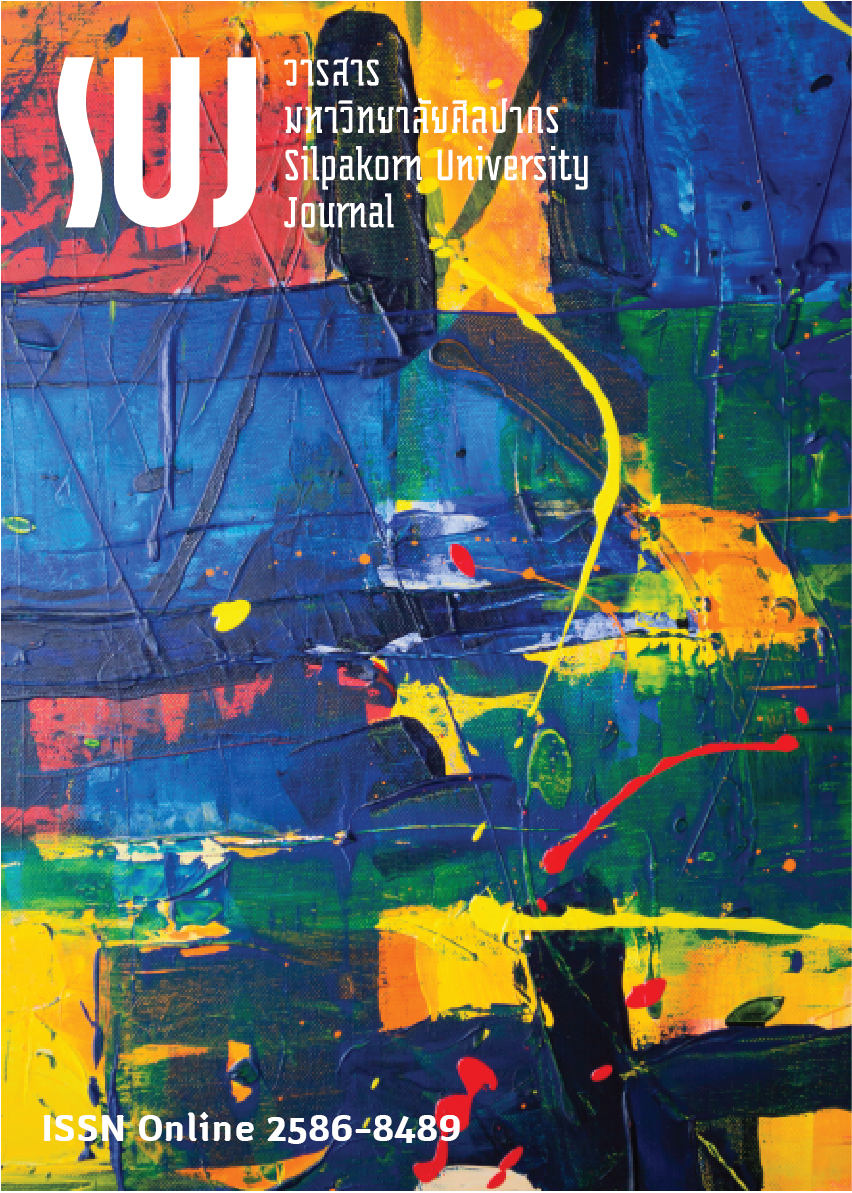ความเชื่อมโยงทางสังคมและวัฒนธรรมระหว่างแรงงานไทยกับแรงงานอาเซียนในธุรกิจโรงแรมภูเก็ต (The social and cultural connectivity between Thai and ASEAN labours of Phuket hotels)
Main Article Content
Abstract
การวิจัยนี้มีวัตถุประสงค์เพื่อศึกษาความเชื่อมโยงทางสังคมและวัฒนธรรมอาเซียน และความเชื่อมโยงทางสังคมและวัฒนธรรมระหว่างแรงงานไทยกับแรงงานอาเซียนของธุรกิจโรงแรมในจังหวัดภูเก็ต โดยใช้รูปแบบการวิจัยเชิงคุณภาพ เก็บรวบรวมข้อมูลด้วยการวิจัยเชิงเอกสารและการวิจัยเชิงสำรวจ โดยเก็บรวบรวมข้อมูลจากผู้จัดการโรงแรม จำนวน 20 คน และผู้ปฏิบัติงานใน 4 แผนก อันได้แก่ แผนกบริการส่วนหน้า แผนกแม่บ้าน แผนกครัว และแผนกบริการอาหารและเครื่องดื่ม จำนวน 80 คน ใช้การวิเคราะห์ข้อมูลเชิงคุณภาพด้วยวิธีวิทยาการเชิงเนื้อหา ผลการศึกษาพบว่า 1) ประชาคมสังคมและวัฒนธรรมอาเซียนให้ความสำคัญกับการขัดเกลาทางสังคมและการศึกษามากที่สุด รองลงมาคือ ระบบเศรษฐกิจ และระบบการสื่อสาร 2) จากการสัมภาษณ์ผู้จัดการและผู้ปฏิบัติงาน มีความเห็นตรงกันว่า แรงงานไทยกับอาเซียนมีความเชื่อมโยงทางสังคมและวัฒนธรรมกันในระบบเศรษฐกิจมากที่สุด รองลงมาคือ การขัดเกลาทางสังคมและการศึกษา และระบบการสื่อสาร สำหรับแนวทางการเสริมสร้างความเชื่อมโยงทางสังคมและวัฒนธรรม ควรช่วยเหลือและร่วมมือซึ่งกันและกันด้วยความหลากหลายทางวัฒนธรรม ความเข้าใจ และเคารพในความแตกต่าง อีกทั้งยังสามารถเรียนรู้ที่จะอยู่ร่วมกัน พร้อมกับการศึกษาวิถีชีวิตของแต่ละฝ่ายให้เข้าใจ เพิ่มความสามารถในการสื่อสารภาษาอังกฤษและเกิดการยอมรับทางเชื้อชาติ ภาษา และวัฒนธรรม ในฐานะเราเป็นประเทศอาเซียนด้วยกัน สามารถนำมาปรับใช้กับความรู้ความสามารถที่แตกต่างกัน เพื่อพัฒนาให้องค์การประสบความสำเร็จตามเป้าหมาย
This research aimed to study ASEAN socio-cultural connectivity and the social and cultural connectivity between Thai and ASEAN labour in hotel business of Phuket. It is qualitative survey research. The data were collected from 20 managers and 80 employees of the reception, the housekeeping, the kitchen, and the food and beverage departments. In analyzing the qualitative data, the content analysis was employed. The study found that 1) the ASEAN Socio-Cultural Community has focused mostly on cultural socialization and education, followed by the linkage of the economy and creating the connection of the communication system. 2) Based on the interview, the managers and employees shared the same opinions that the economy system is mostly connected with the socio-cultural connectivity, followed by the cultural socialization and education, and the communication system. The guidelines to enhance the social and cultural connectivity between Thai and ASEAN labour is to cooperate and assist each other with a multi-cultural understanding, to respect the cultural differences, to learn integrative living and understand others’ ways of life, to improve the ability to communicate in English, and to gain a recognition of different ethnicities, languages, and cultures among ASEAN countries. In addition, the application of various knowledge and skills will develop organizations to achieve their target goals.
Downloads
Article Details

This work is licensed under a Creative Commons Attribution-NonCommercial-NoDerivatives 4.0 International License.
References
Association of Southeast Asian Nations. (2009). ASEAN Socio-Cultural Community Blueprint. Jakarta: ASEAN Secretariat.
Association of Southeast Asian Nations. (2011). Master Plan on ASEAN Connectivity. Jakarta: ASEAN Secretariat.
Association of Southeast Asian Nations. (2013). ASEAN Mutual Recognition Arrangement on Tourism Professionals (MRA)-Handbook. Jakarta: ASEAN Secretariat.
Association of Southeast Asian Nations. (2016). ASEAN Socio-Cultural Community Blueprint 2025. Jakarta: ASEAN Secretariat.
Association of Southeast Asian Nations. (2016a). Master Plan on ASEAN Connectivity 2025. Jakarta: ASEAN Secretariat.
Association of Southeast Asian Nations. (2018). Handbook ASEAN Mutual Recognition Arrangement on Tourism Professionals 2018. Jakarta: ASEAN Secretariat.
Association of Southeast Asian Nations. (2019). ASEAN Integration Report 2019. Jakarta: ASEAN Secretariat.
Das, S. B. (2013). Enhancing ASEAN’s Connectivity. Singapore : Institute of Southeast Asian Studies.
Das, S. B. (2015). Can the China-led AIIB Support the ASEAN Connectivity Master Plan? [Online]. Retrieved January 9, 2020 from https://www.think-asia.org/bitstream/handle/11540/10993/iseas_perspective_2015_30.pdf?sequence=1
Gills, B. K. (2006). Accepting Difference, Finding Tolerance, Practising Dialogue. Forthcoming in Globalizations, 3(4): 1-5.
Hausmann, S. (2018). Accepting Differences. [Online]. Retrieved February 1, 2020 from https://appoquiniminksd.org/ourpages/auto/2018/2/6/46619965/Accepting%20Differences%20_%20PARENT%20GUIDE%20News.pdf
Intal, P. Jr., & Ruddy, L. (2017). Voices of ASEAN: What Does ASEAN Mean to ASEAN Peoples? Manila: Economic Research Institute for ASEAN and East Asia.
Isono, L., & Kumagai, S. (2016). Economic Impacts of Improved Connectivity for ASEAN : An Application Geographical Simulation Model. Asian Economic Policy Review, 11(2): 290-306.
Khongkul, Jarunee. (2020). Multiculturalism in Phuket (วัฒนธรรมข้ามชาติในจังหวัดภูเก็ต). Journal of Cultural Approach, 21(39) : 110-121.
Martinez-Fernandez, C., & Powell, M. (2009). Employment and Skills Strategies in Southeast Asia Setting the Scene. [Online]. Retrieved January 9, 2020 from https://www.oecd.org/indonesia/45592999.pdf
Nangklaphivat, Yuphawan. (2014). Preparation of Thai Labour in Tourism Industry for the ASEAN Economic Community Integration. APHEIT Journal, 20(2): 158-169.
Office of the Permanent Secretary for Culture. (2007). National Cultural Master Plan 2007-2016 (แผนแม่บทวัฒนธรรมแห่งชาติ (พ.ศ. 2550-2559)). Bangkok: Office of the Permanent Secretary for Culture.
Office of the Public Sector Development Commission. (2012). Newsletter 360 Degree Bureaucracy Development (จดหมายข่าว 360 องศา พัฒนาระบบราชการ). n.p.
Pongsapich, Amara. (2010). Society and Culture (สังคมและวัฒนธรรม). Bangkok: Chulalongkorn University.
Prasetyawati, Y. R., & Alverina, C. (2018). Higher Education within ASEAN Connectivity. Asia Pacific Study, 2(1): 46-58.
Rupavijetra, Phetcharee. (2012). Development Students to have Knowledge, Understanding on Cross-Cultural Management and Occupational Planning Toward ASEAN Community and International Level (การพัฒนานักศึกษาให้มีความรู้ ความเข้าใจในเรื่องการจัดการข้ามวัฒนธรรม และการวางแผนอาชีพเพื่อรองรับความเป็นภูมิภาคอาเซียน และระดับสากล). Chiang Mai: Chiang Mai University.
Satsanguan, Ngampit. (2008). Qualitative Research in Anthropology (การวิจัยเชิงคุณภาพทางมานุษยวิทยา). Bangkok: Chulalongkorn University.
Sirait, G. M., & Pinia, N. A. (2016). Gap Analysis on the Competency of Indonesian Tourism Workers in the ASEAN Economic Community. In Asia Tourism Forum 2016 - The 12th Biennial Conference of Hospitality and Tourism Industry in Asia (ATF-16). [Online]. Retrieved July 4, 2020 from https://www.atlantis-press.com/proceedings/atf-16/25856883
Passakonjaras, Somchanok. (2014). Mastering ASEAN (อาเซียน เซียนธุรกิจ). Bangkok: McGraw-Hill.
Tylor, E. B. (1871). Primitive Culture : Researches into the development of mythology, philosophy, religion, art and custom. London: John Murray.
University of Santo Tomas. (2017). Learning Mobility in light of ASEAN Integration Lecture. [Online]. Retrieved February 4, 2020 from http://www.ust.edu.ph/events/learning-mobility-in-light-of-asean-integration-lecture/


